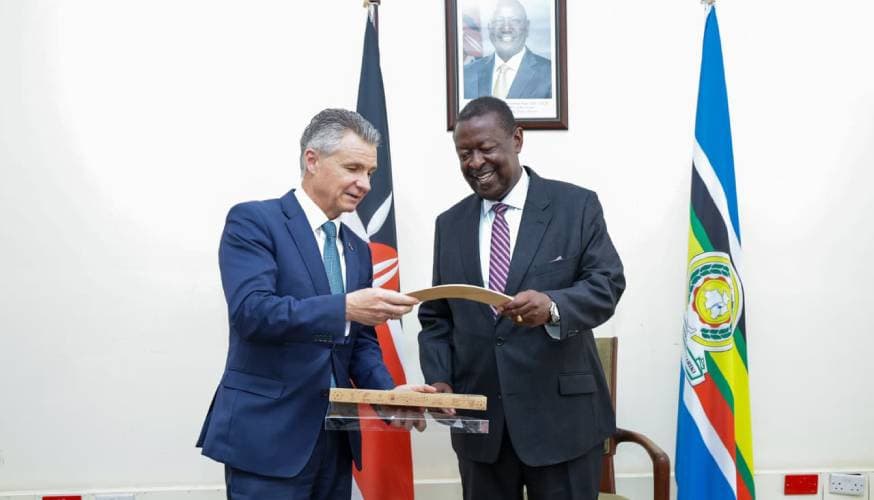We're loading the full news article for you. This includes the article content, images, author information, and related articles.
As Australian experts decry a new environmental law loophole, Kenyan precedents like the SGR railway in Nairobi National Park highlight the risks of granting ministers unchecked discretionary powers over vital ecosystems.

A contentious legal provision in Australia is sending ripples of concern through global environmental policy circles, offering a stark warning for nations like Kenya that are balancing development with conservation. Political integrity experts in Australia have raised alarms over a proposed "national interest" exemption in new nature laws, which would grant the environment minister discretionary power to approve projects that violate environmental protection standards. The debate, which resumed in Australia's lower house on Tuesday, 4 November 2025, centers on fears that such a loophole could be exploited to fast-track damaging projects, including fossil fuel developments, under the guise of national importance.
The proposed overhaul of Australia's Environment Protection and Biodiversity Conservation (EPBC) Act includes the controversial clause allowing the minister to bypass new, legally-binding environmental standards. According to a critical analysis by the Centre for Public Integrity, a non-partisan thinktank, this provision presents "grave concerns about the scope, transparency, and accountability" of ministerial power. While the Australian government insists the exemption is intended for genuine national emergencies or defence projects, it has not ruled out its application for other developments, a vagueness that critics, including former Treasury Secretary Ken Henry, warn could see a "conga line of developers" lobbying for special treatment.
This Australian scenario serves as a critical case study for Kenya, where the invocation of "national interest" has previously justified environmentally controversial infrastructure projects. The most prominent example is the routing of the Standard Gauge Railway (SGR) through the heart of Nairobi National Park, a decision that sparked protracted legal battles and public outcry. Despite protests from environmental groups, the government argued the chosen route was the most economically viable and technically feasible, effectively prioritizing infrastructure development as a matter of national interest over conservation concerns.
The SGR's construction has had tangible negative impacts on the park, including habitat loss, vegetation clearance, and noise pollution that disrupts wildlife. A 2021 study published in the Journal of Environmental Protection confirmed the railway's encroachment, with Phase I alone occupying 87.29 hectares of park land and interfering with critical wildlife migration corridors. This precedent demonstrates how easily environmental safeguards can be sidelined when pitted against large-scale development projects framed as nationally significant.
Similarly, the now-stalled Lamu Coal Plant project was advanced by the government on the grounds of national interest, specifically the need for cheap and reliable energy to fuel industrial growth under Vision 2030. In July 2019, then-Government Spokesperson Cyrus Oguna explicitly stated, "we need to put our national interest first." The project was ultimately halted by the National Environment Tribunal, not because the national interest argument was invalid, but due to the proponents' failure to conduct a thorough environmental impact assessment and ensure public participation, as required by law.
Kenya's primary environmental law, the Environmental Management and Co-ordination Act (EMCA) of 1999, establishes the framework for environmental protection and created the National Environment Management Authority (NEMA). The Constitution of Kenya 2010 further guarantees every citizen the right to a clean and healthy environment. However, the power vested in Cabinet Secretaries and government authorities to push through projects deemed nationally important remains a point of vulnerability.
While EMCA mandates rigorous Environmental Impact Assessments (EIAs) and public consultation, the SGR and Lamu cases show that political will and the framing of economic development as a paramount national interest can exert immense pressure on these regulatory processes. Legal experts note that while Kenyan law provides for judicial review of administrative decisions, challenging a project backed by the highest levels of government on "national interest" grounds is a formidable task for civil society groups and local communities.
The Australian Centre for Public Integrity's report noted it is "highly unusual" for an independent regulatory system to cede such "significant powers" to a minister, arguing that decisions would be better handled by a body "free from political influence and less susceptible to vested interests." This critique resonates deeply in the Kenyan context, where the line between national interest and political or commercial interests can become blurred.
As Australia debates the wisdom of enshrining broad ministerial discretion into its environmental laws, Kenya has already witnessed the consequences. The ongoing ecological pressures on Nairobi National Park and the near-miss with the Lamu coal plant are potent reminders of the need for robust, independent, and transparent environmental governance. The Australian experience should serve as a cautionary tale, reinforcing the argument that ill-defined "national interest" clauses can become tools that undermine the very environmental protections they claim to respect, with lasting consequences for a nation's natural heritage.
Keep the conversation in one place—threads here stay linked to the story and in the forums.
Sign in to start a discussion
Start a conversation about this story and keep it linked here.
Other hot threads
E-sports and Gaming Community in Kenya
Active 9 months ago
The Role of Technology in Modern Agriculture (AgriTech)
Active 9 months ago
Popular Recreational Activities Across Counties
Active 9 months ago
Investing in Youth Sports Development Programs
Active 9 months ago